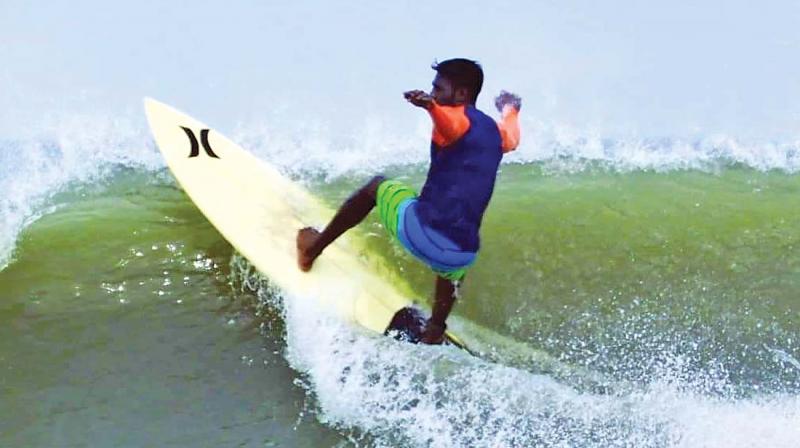Surf is changing their lives now
The sea has been part and parcel of their identity and the waves have gifted them with skills and knowledge crucial to life and livelihood.

The sea and the waves, their fishing nets, baits and ticks bring them their daily bread. The sea has been part and parcel of their identity and the waves have gifted them with skills and knowledge crucial to life and livelihood.
Their daily life is enriched with the skills they have to call upon at the break of each dawn. Tamil Nadu fishermen are, however, not loath to sharing their hard-earned knowledge. Their warmth comes out in their being willing to pass on their knowledge to surfing enthusiasts on the beaches of Kovalam, Mahabalipuram and Rameswaram. The premium surfing clubs on those beaches are providing them with a platform to showcase their expertise, and not just as surfing experts but also as trainers.
Speaking to Deccan Chronicle, Divya Pandurangam of Surf Turf says, “We recruit local people as trainers. As fishermen, they are already familiar and comfortable with the ocean. They know the waves and different elements of nature, like the back of their hands, which makes it very easy for them to catch on with little effort. After training, many have stayed back with us as surfing educators and some have started up their own surfing units.”
“We do not restrict the training sessions to only their familiar environment, they are taken to the other beaches too where they get more exposure and learn the varied patterns of waves as waves differ from place to place,” says Divya with a smile taking pride in how the premium surf club has been boosting Tamil Nadu tourism.
“We are grateful for being able to helping them find alternative occupation, which also serves as a way to spread their culture as we have a lot of foreigners coming over for activities here,” shares Divya excitedly. She recalls with enthusiasm how folks from the fishermen community walk away with the trophies at national surf competitions every year.
Raja Sekar, a fisherman and now a surf trainer, is grateful for the new opportunities. “Initially we used wooden boards. It was an Israeli visiting in 2002 who came with surfing boards and guided us while we were learning the ropes.”
“Moorthy Megavan was the first to complete the training in a more professional way and then he trained us. We had some foreigners also coming over and guiding us. Lots of falling and balancing have contributed to our learning,” shares Raja describing the transition from being an ordinary fisherman to now being a surf trainer.
Moorthy Megavan, co-founder of the Covelong Point surfing school, is happy with the turn of events. “Earlier I used to go fishing, come back home in the evening and life would go on in a circle. Now I get to guide surfing enthusiasts. And as a teacher/ trainer, I feel all the more proud when my boys (who trained under him) go for international level events.”
“Our organisation has 6 full-time surf instructors and 10 life-guard instructors who all are certified by the International surfing association.” Moorthy first got his certificate from the ISA in 2014 after taking written and powerpoint tests and a rigorous practical work that involves swimming running and continuous surfing.
Talking to DC on how the landscape is changing for Tamil Nadu fishermen with new career avenues opening up with the advent of these surf clubs, Arunvignarajah Rajkumar of F45 gym, which gives ample workout opportunity, asserts, “Our gym is not like a regular one. Here members are required to work towards timer and it’s like a group activity. We do more bodyweight workouts. Our fishermen members are naturally trained. They have a fair idea of boards and everything related to them and we are responsible for their fitness. Plus they are always alert and they know they have an added responsibility of saving lives. They are a litle more responsible than the regular people who come for training, in terms of workout.”
Arun does not forget to mention his favourites Santosh , who is a surfing and paddling champion and Rajasekar. “Their command in workouts leaves us amazed.” Knowledge aside, it's their willingness and thirst to learn more that singles them out. They do not know English but the kind of work they do requires them to have a fair knowledge of the language. They make the most out of every opportunity to train foreigners in picking up new words. They never cease to learn and are always pushing boundaries.

